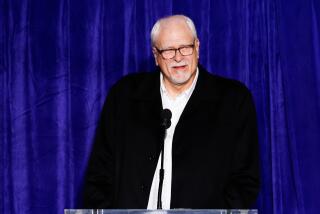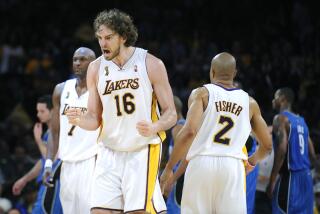What Jackson didn’t say about Auerbach tells us a lot
- Share via
The surest sign of the respect Phil Jackson had for Red Auerbach is the way he refrained from making derogatory comments about him. He didn’t fire the shots, even though you knew he had them loaded.
Snarky comments come naturally to Jackson. It’s almost as if they’re an essential part of his being, like swimming to a shark. He has made dismissive remarks about opposing coaches, entire cities, even religions. But not Auerbach.
He let Auerbach get away with blast after blast, all the while biting his tongue so hard it’s surprising it didn’t bleed.
Sunday, the day after Auerbach died, Jackson wouldn’t even concede that Auerbach didn’t value Jackson’s accomplishments.
“That’s not true at all,” Jackson said. “Red and I had a conflict, always, because I was a New York Knick [player]. It was just a rivalry. That’s the way Red was. It was an honor that he had that kind of attitude, actually. It was an honor to be named in the same breath [when] people talk about championships.”
They’re linked because Jackson is the only NBA coach to equal the nine championships Auerbach won while coaching the Boston Celtics. What moves Auerbach into his own special tier of NBA Hall of Famers is that he assembled the talent for those teams -- and seven other Celtics championship squads.
And Auerbach made sure people knew the difference.
“How [Jackson] did it is a lot easier than how I did it, to be brutally frank,” Auerbach said in a 2004 interview with The Times. “He has nothing to do with the organization of his ballclub. I had to do all my own scouting. I didn’t have videotapes and four or five assistant coaches. And we didn’t have the money to compete.”
Auerbach used to say Jackson “picked his spots” because he took over the Chicago Bulls when Michael Jordan and Scottie Pippen were in their prime, and won championships his first three years with the Lakers, just as Shaquille O’Neal and Kobe Bryant ripened.
But when Jackson returned last year to coach a Shaq-less Lakers team that had missed the playoffs the previous season, Auerbach told USA Today, “It’s done for one reason -- the money.”
It was obvious that Auerbach would find any way to criticize Jackson. Maybe that’s why Jackson treated Auerbach’s comments like talk-show babbling. He knew Auerbach would invent a way to belittle him, if necessary, because to Auerbach anything not achieved by a Celtic wasn’t truly an accomplishment.
So Jackson showed restraint. About the closest he came to what the political campaigners call “going negative” was in response to an Auerbach complaint that Jackson didn’t send him flowers when he was hospitalized last year. Jackson responded that he tried, but there was a delivery mix-up.
Then he added with a smile, “It’s probably a good deal I didn’t send it, you know. [The flowers] probably would have died right away when they walked in his room.”
Sunday, Jackson did recall what his mentor, Knicks coach Red Holzman, said to him when New York beat Boston in the 1973 Eastern Conference finals: “Sometimes you think good overcomes evil. And this is one of those times.”
Auerbach didn’t mind being hated. I’m sure he lighted those victory cigars as much to irritate his opponents as he did to satisfy a nicotine craving. And really, in hindsight, you have to appreciate it. Besides, the Lakers’ breakthrough victory over the Celtics in the 1985 NBA Finals wouldn’t have been half as enjoyable without Auerbach’s involvement.
“That was good for the game,” said Lakers assistant coach Brian Shaw, who was drafted by Auerbach and the Celtics. “It made that rivalry what it was. He was going to do whatever it took to give his team the edge.”
Sure, Auerbach might conveniently forget to heat the visiting locker rooms in Boston Garden during the winter. But mostly he gave his team the edge through shrewd moves, including fleecing Golden State for Robert Parish and a first-round pick used on Kevin McHale.
“In a lot of ways [he was] part of the arrogance with which they played,” said Lakers assistant Kurt Rambis, a veteran of the Lakers-Celtics wars in the 1980s. “It was what brought that competitiveness out in that ballclub. He was an integral part in assembling those teams. You look back at the talent they had on those teams, it was amazing.”
Lakers owner Jerry Buss said: “Auerbach was the deciding factor. You’ve really got to hand it to this guy.”
And Auerbach did manage to find some good things to say about Jackson.
“In spite of all that, Phil’s a good coach,” Auerbach said in the 2004 Times interview. “He’s in control, his players do what he tells them to do and his substitutions are good. But that doesn’t mean I’ll invite him to dinner.”
I asked Jackson what, if anything, he incorporated from Auerbach.
“The fact that he played an up-tempo game, kept the pressure on the guard, was a believer in defense, those things are part of what I’ll cling to all the time as part of what you have to do to win championships,” Jackson said. “More than anything else, he set a standard that people want to achieve in this league and fought to try to duplicate.”
And not to denigrate, which for Jackson is the ultimate compliment.
*
J.A. Adande can be reached at j.a.adande@latimes.com. To read more by Adande, go to latimes.com/adandeblog.
More to Read
All things Lakers, all the time.
Get all the Lakers news you need in Dan Woike's weekly newsletter.
You may occasionally receive promotional content from the Los Angeles Times.






